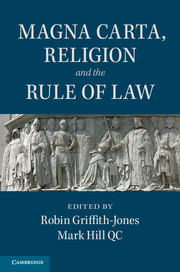Book contents
- Frontmatter
- Contents
- List of contributors
- Preface and acknowledgments
- I Introduction
- II The birth of Magna Carta and the spread of its principles
- 3 Due process in Magna Carta: its sources in English law, canon law and Stephen Langton
- 4 From Charter to common law: the rights and liberties of the pre-Reformation Church
- 5 Magna Carta and the law of nations
- 6 Magna Carta and personal liberty
- 7 Towards a new Magna Carta for early modern England
- 8 Differences over the foundation of law in seventeenth- and eighteenth-century America
- III Comparative religious approaches to Magna Carta's rule of law
- IV The contemporary inheritance of Magna Carta
- Appendix The Charters in translation
- Bibliography
- Index
5 - Magna Carta and the law of nations
from II - The birth of Magna Carta and the spread of its principles
Published online by Cambridge University Press: 05 May 2015
- Frontmatter
- Contents
- List of contributors
- Preface and acknowledgments
- I Introduction
- II The birth of Magna Carta and the spread of its principles
- 3 Due process in Magna Carta: its sources in English law, canon law and Stephen Langton
- 4 From Charter to common law: the rights and liberties of the pre-Reformation Church
- 5 Magna Carta and the law of nations
- 6 Magna Carta and personal liberty
- 7 Towards a new Magna Carta for early modern England
- 8 Differences over the foundation of law in seventeenth- and eighteenth-century America
- III Comparative religious approaches to Magna Carta's rule of law
- IV The contemporary inheritance of Magna Carta
- Appendix The Charters in translation
- Bibliography
- Index
Summary
The title of this chapter requires a brief explanation. It refers to two separate but related approaches to understanding England's Great Charter of 1215. Although the two are not among the ways most scholars have approached the Charter, neither approach is anachronistic. They both fit within common juridical assumptions of the thirteenth century. The first involves a comparison between Magna Carta and the actual laws of medieval European nations. These laws were being widely formulated and put into written form during the twelfth and thirteenth centuries. Their provisions are worth examining alongside those of Magna Carta in a search for both common and discordant elements. The second involves the ius gentium, the Latin phrase commonly used to describe the law of nations. Jurists counted it as one of the three (or four) basic sources of law on which all legal regimes were based. This second and more ‘scholastic approach’ to the Charter's provisions provides a way of placing it within then contemporary assumptions about law. The comparison may even help to interpret some of its provisions.
This chapter's aim is thus to read Magna Carta from a European perspective, seeking an understanding of the Charter in the context of assumptions about law that prevailed in its time and that were also expressed in similar statements of law compiled on the Continent. Maitland once wrote that in no age of European history since the classical days of Roman law had ‘so large a part of the sum total of intellectual endeavour been devoted to jurisprudence’. A recent general treatment of European legal history speaks of ‘the universality of legal thinking’ during these formative years of Western law. Their words invite us, though they do not compel us, to adopt this way of approaching England's Great Charter.
European compilations of basic laws
The obvious place to begin the first inquiry is with the conclusions of the leader in the field, Professor Sir James Holt. His recent death we lament and his many contributions to the study of the Great Charter we consult. Professor Holt's researches led him to conclude that at the time of its drafting, Magna Carta was ‘far from unique, either in content or in form’.
- Type
- Chapter
- Information
- Magna Carta, Religion and the Rule of Law , pp. 70 - 80Publisher: Cambridge University PressPrint publication year: 2015



